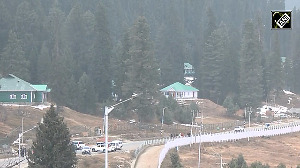In an attempt to combat competition from local beauty and wellness salons, companies like Lakme, Habibs and VLCC are gearing up to offer specialised and upgraded services.
The beauty and wellness services industry is mainly unorganised with local-level players dominating the market.
According to market data, the beauty and wellness industry, which stands at Rs 1,500 crore (Rs 15 billion) right now, was only Rs 400 crore (Rs 4 billion-)-strong in 2004.
With the growth in sedentary lifestyles, rise in disposal income levels, and consumers' increased appetite to indulge themselves, the industry is estimated to touch the Rs 2,000 crore (Rs 20 billion) mark by 2008-end.
A lot of small-time entrepreneurs are, therefore, also investing in setting up local beauty salon chains, offering the same regular services.
This has given rise to a lot of competition for organised beauty and wellness players like Lakme, Habibs and VLCC, who decided on major expansion of their businesses only recently.
According to market estimates, today, for every one organised beauty and wellness salon, there are four local salons.
So, in the face of competition, the organised players have identified specialised and tailor-made services as one way to combat the local-level competition.
Said Yogesh Sethi, CEO of VLCC Healthcare, "Since the beauty and wellness services industry is mainly fragmented, we have identified offering customised services as a key to build brand loyalty among customers. For instance, a lot of customers come to a VLCC beauty centre to avail beauty treatments and make-ups, facials, and hair services. We, therefore, upgrade our staff every six months on the changes in make-up, hair styling and other services, so that we can offer upgraded services."
Offering tailor-made services would mean understanding what kind of make-up would go with what kind of outfit and during which part of the day.
Even for bridal make-up, one would need differentiated make-up during the day, evening and during reception.
Even otherwise, VLCC offers various customised make-up services that include light makeup, evening makeup, party makeup, theme party makeup, reception makeup, etc.
VLCC also works with fashion designers and bollywood make-up artists to understand the trends in beauty and wellness services.
"Such customisation will not be available at local salons," added Sethi.
Similarly, Lakme, which has 102 beauty and wellness services salons across 38 cities and plans to have a total of 140 by 2008-end, is constantly looking at introducing specialised services at its salons.
"For instance, we just launched the free-spirit service that uses floral extracts for facials," said an official source at Lakme.
According to Lakme, floral extracts helps in improving blood circulation thereby giving the face a healthy glow.
VLCC, too, is constantly upgrading itself to offer advanced treatments like Collagen Fillers - which are non-animal stabilised hyaluronic acid available in pre-filled sterile syringes that are injected into the deeper folds of the skin causing immediate improvement - some of them are Nasolabial Folds and oral commissures.
At Habibs, hair-styling makes up for 75 per cent of its services.
"Our brand loyalty completely depends on consumers' experience at the salon. We have a 100 different hair styles to suit every face. We constantly keep introducing more hair styles to suit every mood. This helps Habibs combat competition from local salons as they can not offer the variety we offer here," said an official source at Habibs.
Another way to combat competition from local salons is city and region-specific pricing.
Lakme, Habibs and VLCC, have all introduced region-specific pricing to suit every city.
Habibs, that has 69 salons at present and plans to take it to a total of 200 by March 2008, has classified cities depending on consumer spending trends and capacity.
"So, if hair-cutting at Habibs cost Rs 750 in Delhi, it would cost Rs 550 in Mumbai and Rs 350 in Kolkata," said the Habibs source.
Similarly, Lakme has categorised cities into A, B and C categories.
So, if a service was being offered for Rs 200 at an A category city, the B category would see it being offered for Rs 150, while C could avail it for Rs 100, indicating a difference of Rs 50 per category city.
VLCC, too, has categorised cities and as it plans to set up more centres across India, the price difference for cities would be in the range of 8 to 15 per cent.
A third way for organised beauty chains to combat competition from local salons is by introducing specialised FMCG products to address specific problems.
For instance, Habibs is planning to launch hair serum, henna, moisturisers, face creams, and shampoos - all to address specific haircare and skincare problems of consumers.
Habibs products will be available across Habibs outlets in India.
"We have a brand equity in the market and all our FMCG products will address specific problems and needs, an initiative that local salons don't offer," said the Habibs source.
VLCC, too, plans to increase its FMCG product portfolio in its existing categories.






